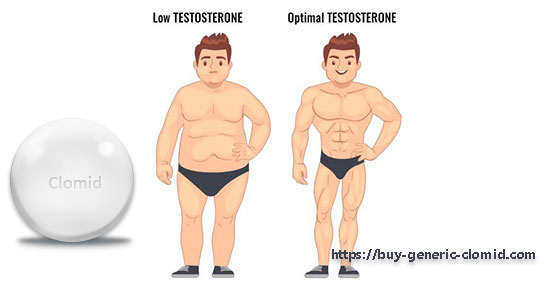Clomid for men: Clomiphene Citrate (Clomid, Clostilbegit) is often prescribed to men with low testosterone levels as a replacement therapy. Low testosterone (hypogonadism) cannot be considered a normal healthy condition for a man in his 30s, 50s, or 75s.
Symptoms of this hormonal disorder usually include:
- lack of energy;
- depressed mood;
- loss of vitality;
- muscle atrophy (sarcopenia);
- muscle pain;
- low libido;
- erectile dysfunction;
- weight gain,
- bone loss (osteopenia) and osteoporosis;
- moderate anemia;
- increased risk of Alzheimer’s disease, prostate cancer, and an increased risk of death.
Low testosterone levels in men can be caused by problems in the testes (or gonads). This condition is called primary hypogonadism, it is associated with mumps, testicular trauma, testicular cancer and is treated only with testosterone replacement therapy.
The most common causes of low testosterone (hypogonadism) are problems with the pituitary gland and/or hypothalamus in the male brain. The reduced T caused by such “brain” problems is collectively referred to as secondary hypogonadism, or hypogonadotropic hypogonadism. It can be the result of depression, anxiety, traumatic brain injury, excessive exercise, an overdose of anabolic steroids, diabetes, lack of sleep, or taking certain medications.
Clomiphene for men: What is assigned for?
Traditionally, if low testosterone is diagnosed, a man is prescribed testostin replacement therapy in the form of a cream, gel, tablet, patch or injection. And while these types of therapies are effective, each of them has side effects. For example, testicular shrinkage, gynecomastia (breast enlargement), low sperm count, and polycythemia (an overabundance of red blood cells) are common side effects of T replacement therapy (for most patients, these side effects are treatable and do not exceed the potential benefit of hormone treatment).
However, in particular, due to the decrease in the number of sperm, this method of increasing testosterone is not the best option for men who want to have children. Young men with hypogonadism are usually prescribed clomiphene citrate (CC tablets, or Clomid) and / or human chorionic gonadotropin (hCG). These drugs have been used by specialists for many decades to increase the natural production of testosterone, sperm, and increase the likelihood of conception in patients. This method of treatment causes the testes to produce T and thereby increases the natural level of testosterone.
When a healthy man’s pituitary gland releases luteinizing hormone (LH) into the bloodstream, the testes receive a signal to produce testosterone. After that, some of the testosterone is converted to estrogen (the female hormone), and the pituitary stops producing LH.

Clomid for men works by blocking estrogen in the pituitary gland and hypothalamus. Thus, estrogen does not signal the brain to stop producing LH. Luteinizing hormone continues to be produced, and as a result, the production of testostin in the testicles increases.
When using traditional methods of testosterone replacement therapy, the brain (hypothalamus and pituitary gland) receives the message that there is a lot of T in the testes and it no longer needs to be produced. Subsequently, the pituitary gland ceases to produce LH, and the natural production of testostin (and sperm) in the testes ceases, so the traditional results of testosterone replacement therapy — TST) are a decrease in the testicles and a low sperm count.
Clomiphene for men together with hCG (or without it) does not turn off the production of test-na. Depending on the condition, its reception can be continuous or course, for 3-6 months.
Clomiphene and hCG were previously thought to work only on young men, but in the last decade, these drugs have also been successfully used by older patients.
Compared to testosterone replacement therapy, clomid for men with hypogonadism can be considered a better alternative due to the fact that:
- Clomiphene stimulates the body’s own production of test-na.
- Clomid is available in tablets and is easy to take.
- This drug is quite cheap and affordable.
- Clomid has a relatively low risk of side effects.
The main active ingredient clomifene is available under several trademarks: “Clostylbegit”, “Clomid” (Clomid), “Serpafar”. The main drug that can be found and purchased is “Clostylbegit” or generic clomid.
Clomid for men: Conclusion
Clomid for men can serve as a good alternative to dough therapy in both the short and long term. Despite this, you can only take clomiphene as prescribed and under the supervision of a doctor.